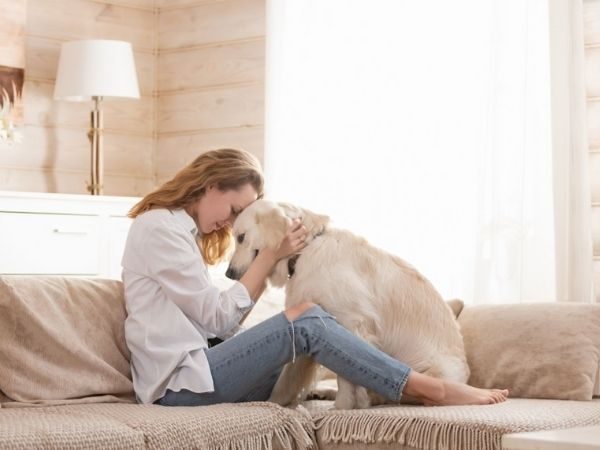If you’ve been thinking about adopting a new dog, consider adopting a senior dog! Adopting a pet from a shelter is a noble act. The pet gets a second chance at love, and it reduces the number of euthanized animals. However, many potential pet parents overlook older dogs and go for adorable puppies. It is okay to adopt a bouncing little puppy. The pup could be perfect for you. But you will also leave many older dogs lonely at the shelter.
Adopting a senior dog can be just as rewarding as taking on the youngsters. But first, you have to be a good match for the old-timer. Read on and learn what you should consider and some of the benefits you stand to gain.
Considerations for older dogs
 Older dogs, like older folk, require more attention to their health needs and might not be enthusiastic about hyped-up environments or company. You may also have to deal with deeply ingrained habits that require patience, love, and persistence to change. Since an older dog has an established personality, consider if you are a match. Have a chat with the staff at the shelter before you settle on one. Talk about your home and lifestyle. Let them advise you about which dog would be a good match. Here are some of the issues you may discuss and consider.
Older dogs, like older folk, require more attention to their health needs and might not be enthusiastic about hyped-up environments or company. You may also have to deal with deeply ingrained habits that require patience, love, and persistence to change. Since an older dog has an established personality, consider if you are a match. Have a chat with the staff at the shelter before you settle on one. Talk about your home and lifestyle. Let them advise you about which dog would be a good match. Here are some of the issues you may discuss and consider.
Health challenges
Depending on how old the senior dog is, you may encounter different health issues. Middle-age to senior dogs, especially of large breeds, are susceptible to arthritis. Other health conditions that affect older dogs include heart, liver, kidney diseases, and cancer. Senior dogs can also suffer from gastrointestinal and urinary tract conditions.
As a senior dog owner, you need to be ready to take your furry buddy to the vet more frequently. It will keep the dog in good health and perhaps add more years to his life.
Lacking energy around children and other pets
As a dog crosses the eight-year mark, the enthusiasm to hang around younger, energetic pets or children wanes. The senior dog could be in pain due to health conditions, or perhaps their senses are not what they used to be. An older dog could be startled by a charged-up child or pet, and he may react aggressively.
Therefore, it is vital to know and understand the dog’s temperament and body language. If it seems agitated or scared, you should know the signs and take appropriate action.
Mobility issues
Due to the health challenges mentioned above or possible weight issues, a senior dog may have mobility challenges. That means your furry buddy might not be able to accompany you during hikes or workouts. He might prefer to lie on the couch or his warm bed all day.
A senior dog could also have challenges related to seeing, hearing, or another physical disability. You may need to purchase mobility aids and other equipment to help the dog to get by.
Separation anxiety
Apart from the physical challenges, a senior dog could be suffering from psychological issues.
Since the dog was already settled in a home and probably had a routine, moving to a new environment could trigger separation anxiety and general anxiety. The old-timer could experience difficulty adjusting to new surroundings, leading to ongoing stress and anxiety.
The dog could eventually settle. But you may require expert help to deal with separation anxiety or other behavior issues. You may also want to provide them with a peaceful, calming, and comfortable bed and environment.
Although adopting a senior dog can have its fair share of challenges, remember that each dog is unique. Your potential older companion might not experience any of these issues! He could be as fit and healthy as a fiddle and full of energy or playful like a pup. Besides, there are many benefits of adopting an older dog!
Here are some of the top rewards you can consider.
Benefits of adopting a senior dog
You’ll know a lot more about your buddy (predictable behavior)
Puppies may be small and cute, but they are all unpredictable. It is up to the pet parent to shape their behavior. But this is not the case for senior dogs. They already have an established behavior pattern and personality. An older dog who is friendly and loves to hang out with people and other pets will probably not change after adoption. He may go through an adjustment period. But eventually, he will resume normalcy.
You get the option to choose a companion whose behavior and personality can match yours.
Less training
Many senior dogs also understand basic instructions and will not engage in destructive activities. If the previous owner, or shelter staff, have already trained him, you won’t have to do it again.
You may not need to dog-proof your home or keep checking different corners for toileting accidents.
Less physically demanding
Being less energetic and less agile can also be an advantage. It means the dog will require less exercise and will not push you to do vigorous activities when you cannot. The dog would be an excellent lap companion.
A final word on adopting a senior dog
Before you adopt an older dog, have a chat with the shelter’s staff. Learn more about the dog, its history, personality, and health. Finding the right vet and behavior support specialist is vital to your friendship. Since you already know what to expect from the old-timer, you could end up forming a stronger bond than a puppy.
A big part of adopting a dog is ensuring they are happy and healthy, with a good mix of mental stimulation, regular low-impact exercise, regular grooming and visits to their veterinarian, and a home that is safe for them, particularly as they age and could be at risk for falling on slippery surfaces. Read some helpful tips on keeping your senior dog and other pets happy at home.

